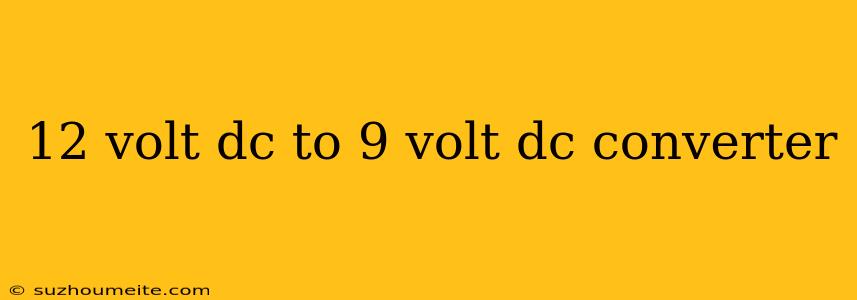12 Volt DC to 9 Volt DC Converter: A Comprehensive Guide
When working with electronic devices, it's common to encounter situations where a DC power source with a specific voltage is required, but the available power source has a different voltage. One such scenario is converting 12V DC to 9V DC. In this article, we'll explore the different methods and circuit designs for converting 12V DC to 9V DC.
Why Convert 12V DC to 9V DC?
There are several reasons why you might need to convert 12V DC to 9V DC:
- Compatibility: Some devices, such as guitar pedals, effects units, and other audio equipment, require a 9V DC power supply to function properly.
- Power efficiency: Converting 12V DC to 9V DC can help reduce power consumption and heat generation in electronic devices.
- Safety: In some cases, using a lower voltage power supply can reduce the risk of electrical shock or damage to sensitive components.
Methods for Converting 12V DC to 9V DC
There are several methods to convert 12V DC to 9V DC, each with its own advantages and disadvantages.
Voltage Regulator IC (Linear Regulator)
One of the simplest and most common methods is to use a voltage regulator IC, such as the 7809 or LM7809. These ICs can be used to regulate the output voltage to a fixed value, in this case, 9V DC.
Advantages:
- Simple and easy to implement
- Low cost
- High accuracy and stability
Disadvantages:
- Heat generation and power loss
- Limited current output capability
DC-DC Converter Modules
DC-DC converter modules are small, pre-built modules that can be used to convert 12V DC to 9V DC. These modules typically use a switching regulator to achieve high efficiency and compact size.
Advantages:
- High efficiency and low heat generation
- Compact size and light weight
- High current output capability
Disadvantages:
- More expensive than voltage regulator ICs
- May require additional components (e.g., capacitors, inductors)
Custom Circuit Designs
For more complex or high-power applications, custom circuit designs can be used to convert 12V DC to 9V DC. These designs can be based on various topologies, such as buck converters, boost converters, or switching regulators.
Advantages:
- High flexibility and customization
- Can be designed for high-power or high-current applications
- Can be optimized for specific requirements (e.g., efficiency, size, cost)
Disadvantages:
- Requires significant design expertise and experience
- May require multiple components and complex calculations
Choosing the Right Method
When selecting a method for converting 12V DC to 9V DC, consider the following factors:
- Current requirements: How much current does your device require?
- Power efficiency: Do you need high efficiency to minimize heat generation and power loss?
- Size and cost constraints: Are you working with limited space or budget?
- Design complexity: Do you have the expertise and resources to design a custom circuit?
Conclusion
Converting 12V DC to 9V DC is a common requirement in many electronic devices and applications. By choosing the right method, you can ensure reliable and efficient power conversion while meeting your device's specific requirements. Whether you opt for a voltage regulator IC, a DC-DC converter module, or a custom circuit design, careful consideration of the advantages and disadvantages of each method will help you make an informed decision.
